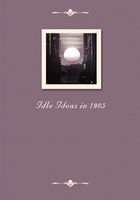
第35章 SHOULD WE SAY WHAT WE THINK,OR THINK WHAT WE SAY?
Thinking of all the people that had died,I pictured the place overcrowded.Almost I felt sorry for the Devil,nobody ever coming his way,so to speak.I saw him in imagination,a lonely old gentleman,sitting at his gate day after day,hoping against hope,muttering to himself maybe that it hardly seemed worth while,from his point of view,keeping the show open.An old nurse whom I once took into my confidence was sure,if I continued talking in this sort of way,that he would get me anyhow.I must have been an evil-hearted youngster.The thought of how he would welcome me,the only human being that he had seen for years,had a certain fascination for me;for once in my existence I should be made a fuss about.
At every public meeting the chief speaker is always "a jolly good fellow."The man from Mars,reading our newspapers,would be convinced that every Member of Parliament was a jovial,kindly,high-hearted,generous-souled saint,with just sufficient humanity in him to prevent the angels from carrying him off bodily.Do not the entire audience,moved by one common impulse,declare him three times running,and in stentorian voice,to be this "jolly good fellow"?So say all of them.We have always listened with the most intense pleasure to the brilliant speech of our friend who has just sat down.
When you thought we were yawning,we were drinking in his eloquence,open-mouthed.
The higher one ascends in the social scale,the wider becomes this necessary base of make-believe.When anything sad happens to a very big person,the lesser people round about him hardly care to go on living.Seeing that the world is somewhat overstocked with persons of importance,and that something or another generally is happening to them,one wonders sometimes how it is the world continues to exist.
Once upon a time there occurred an illness to a certain good and great man.I read in my daily paper that the whole nation was plunged in grief.People dining in public restaurants,on being told the news by the waiter,dropped their heads upon the table and sobbed.Strangers,meeting in the street,flung their arms about one another and cried like little children.I was abroad at the time,but on the point of returning home.I almost felt ashamed to go.Ilooked at myself in the glass,and was shocked at my own appearance:
It was that of a man who had not been in trouble for weeks.I felt that to burst upon this grief-stricken nation with a countenance such as mine would be to add to their sorrow.It was borne in upon me that I must have a shallow,egotistical nature.I had had luck with a play in America,and for the life of me I could not look grief-stricken.There were moments when,if I was not keeping a watch over myself,I found myself whistling.
Had it been possible I would have remained abroad till some stroke of ill-fortune had rendered me more in tune with my fellow-countrymen.
But business was pressing.The first man I talked to on Dover pier was a Customs House official.You might have thought sorrow would have made him indifferent to a mere matter of forty-eight cigars.
Instead of which,he appeared quite pleased when he found them.He demanded three-and-fourpence,and chuckled when he got it.On Dover platform a little girl laughed because a lady dropped a handbox on a dog;but then children are always callous--or,perhaps,she had not heard the news.
What astonished me most,however,was to find in the railway carriage a respectable looking man reading a comic journal.True,he did not laugh much:he had got decency enough for that;but what was a grief-stricken citizen doing with a comic journal,anyhow?Before Ihad been in London an hour I had come to the conclusion that we English must be a people of wonderful self-control.The day before,according to the newspapers,the whole country was in serious danger of pining away and dying of a broken heart.In one day the nation had pulled itself together."We have cried all day,"they had said to themselves,"we have cried all night.It does not seem to have done much good.Now let us once again take up the burden of life."Some of them--I noticed it in the hotel dining-room that evening--were taking quite kindly to their food again.
We make believe about quite serious things.In war,each country's soldiers are always the most courageous in the world.The other country's soldiers are always treacherous and tricky;that is why they sometimes win.Literature is the art of make-believe.
"Now all of you sit round and throw your pennies in the cap,"says the author,"and I will pretend that there lives in Bayswater a young lady named Angelina,who is the most beautiful young lady that ever existed.And in Notting Hill,we will pretend,there resides a young man named Edwin,who is in love with Angelina."And then,there being sufficient pennies in the cap,the author starts away,and pretends that Angelina thought this and said that,and that Edwin did all sorts of wonderful things.We know he is making it all up as he goes along.We know he is making up just what he thinks will please us.He,on the other hand,has to make-believe that he is doing it because he cannot help it,he being an artist.
But we know well enough that,were we to stop throwing the pennies into the cap,he would find out precious soon that he could.
The theatrical manager bangs his drum.
"Walk up!walk up!"he cries,"we are going to pretend that Mrs.